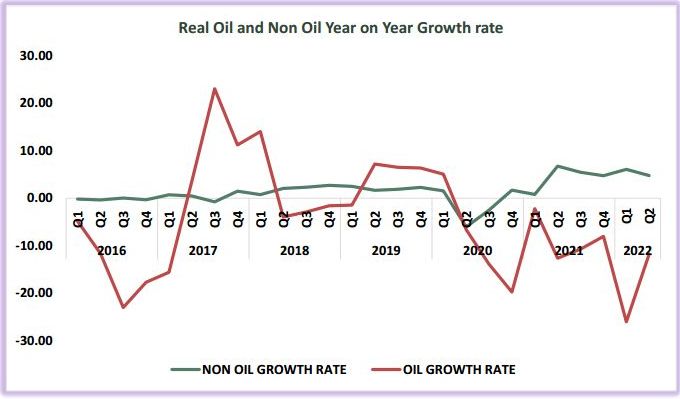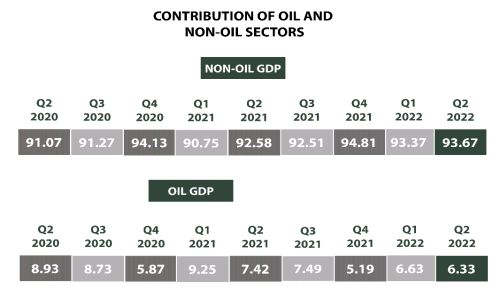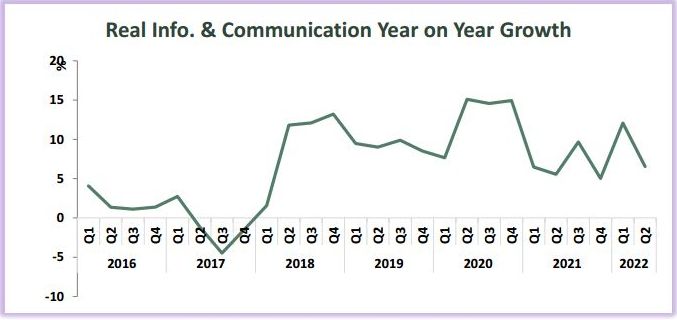The News:
Data from the National Bureau of Statistics (NBS) revealed that the country’s Information and Communication Technology (ICT) sector contributed 18.44% to the national GDP in the second quarter of 2022.
The NBS figure makes it the highest ICT contribution ever to Nigeria’s GDP.
Why it Matters:
For years, the Nigerian economy has been majorly dependent on the oil sector as its major source of revenue. However, in recent years, the economy has been experiencing a paradigm shift whereby non-oil sectors are outdoing the oil sector, hence, calling the attention of the government to promote their productivity.

In Q2 2022, the oil sector recorded a contribution of 6.33% to the National GDP.Whereas the non-oil sector grew by 4.77%, thus contributing up to 93.67%. This was higher than the share recorded in Q2 of 2021 which was 92.58% and higher than the first quarter of 2022 which was recorded as 93.37%.

The NBS recorded that the main drivers of the sector were Information and Communication (Telecommunication); Trade; Finance and Insurance (Financial Institutions); Transportation (Road Transport); Agriculture (Crop Production) and Manufacturing (Food, Beverage & Tobacco).
The ICT Sector:
In Q2 2022, the sector recorded a growth rate of 6.55% in real terms, year-on-year. From the rate recorded in the corresponding period of 2021, there was an increase of 0.99% points. Quarter-on-Quarter, the sector exhibited a growth of 13.41%, contributing 18.44% which is higher than in the same quarter of the previous year in which it represented 17.92% and higher than the preceding quarter in which it represented 16.20%.

The country’s Information and Communication sector is composed of the four activities of Telecommunications and Information Services; Publishing; Motion Picture, Sound Recording and Music Production; and Broadcasting.
In the last 20 years, Nigeria has achieved robust growth in its telecommunication industry where it went from less than half a million connected telephone lines to over 200 million active mobile lines as at April, 2022. The broadband penetration in Nigeria is now at 42.79%.
The country has grown from Second Generation (2G), to 3G, 4G and now 5G as well as implementing vigorous financial inclusion initiatives riding on robust digital infrastructure. It accounts for 82% of Africa’s ICT market and 29% of continental Internet usage.
What the Minister of Digital Economy said:
In a statement signed by Dr Femi Adeluyi, Technical Assistant (Research and Development); Minister of Communications and Digital Economy, Isa Pantami expressed excitement over the “Unprecedented” 18.44% highest ever contribution to Nigeria’s GDP.
The report read that, “this is the highest contribution of ICT to the GDP and is truly unprecedented and marks the third time that the sector has achieved an unprecedented contribution to Nigeria’s GDP during the tenure of the honorable Minister.”
The Minister, according to the statement, also praised the Buhari-led administration for its commitment to the development of the digital economy, stating that the growing contribution of the ICT sector is as a result of the diligent implementation of the National Digital Economy Policy and Strategy (NDEPS).
“Stakeholder engagement and creation of an enabling environment have all played an important role in this achievement. The support of President Muhammadu Buhari, GCFR, has contributed immensely to the impressive developments in the sector,” he highlighted.
Previous Unprecedented Results and Contributions:
The first unprecedented contribution to the country’s economy was in Q1 2020 when the sector contributed 14.07% to total real GDP. This was the only double digit growth rate that exceeded the aggregate growth rate of all the seven fastest growing sectors during the quarter; higher than its contribution a year earlier (13.32%) and in the preceding quarter, in which it accounted for 13.12%.
The Nigerian Communications Commission (NCC) in a press statement published in February, 2021 recorded that the Nigerian telecommunications industry was one of the sectors whose performance lifted the country out of recession in Q4 2020, contributing 12.45% to the country’s GDP.
The sector had also saved over N5.4 billion for the Federal Government through its IT projects clearing programmes in the last two years.
In Q2 2021, the ICT sector contributed 17.92% to the national GDP, compared to 14.91% in Q1 of the same year and 17.83% in the previous year.
Q4 2021 saw another groundbreaking result as the sector contributed 15.21% to the total real GDP. Although this result showed a slow down of the sector’s growth rate, it was however, higher than that of the same quarter of the previous year in which it represented 15.06% and the preceding quarter with 14.20%.
At the maiden edition of the Digital Nigeria day, a virtual news conference held to celebrate the day in Abuja, Pantami, represented by Mr Bitrus Nabasu, mentioned that there were more than 1,667 projects and centers established in the sector, while an additional 455 were ongoing. According to the Minister, 219,196 citizens had benefited from diverse digital skills training organized by the ministry.
Final Note:
“The steady growth of the telecoms sector over the years with its pervasive positive impact on all other sectors of the economy in terms of increased automation of processes and digital transformation in service delivery has been remarkable. The growth trend since 2015 has reawakened hope that the economic diversification dreams of the country may finally be a reality as the sector continues to energize significant economic activities in the services sector of the economy” — NCC.

































